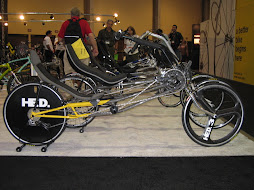This on the top page of Reuters. Yahoo. Sounds like we are finally getting somewhere - and we are not going by car!

Car ownership and the serendipitous pleasure of the highway have been a celebrated part of American life. But several signposts suggest America's love of driving is stalling. Full Article
"serendipitous pleasure of the highway" is a bit too poetic a description for the horror of the highway, but there were a few choice quotes in this article:
> "I see people cutting back who don't even need to cut back."
Duh. It is called a fundamental shift in consumption patterns.
>"It was as if people had started a new travel behavior, a new habit," Miller said. "And they have stuck with their habit."
Yup. Get used to it. Auto advertising dollars are like water on a ducks back these days.
>"We were road hogs," said John Townsend, spokesman for the American Automobile Association's mid Atlantic club.
Spoken like a true recovering alcoholic. Damn right you were.
>Some warn the American consumer will revert to old habits if the economy roars back.
If the full power of the money set aside by the US federal government for rail networks, transit and other sustainable transport initiaves is allowed to flower into real "brick and mortar" new public transport and transit systems to support the car-free lifestyles that people are so very clearly wanting, then there is very little chance that America will go back to its bad old ways. And if it does, we are all screwed. China, India and others will be watching very carefully.
>Americans also have started to embrace car sharing. Zipcar, the world's largest car-sharing company that rents cars by the hour or day, saw its membership soar 50.3 percent in the past 12 months.
>Zipcar chief executive Scott Griffith said he sees a major shift in philosophy that could stay in place for a long time.
>He said his firm's surveys show people take 46 percent more public transit trips, 26 percent more walking trips and about 10 percent more bicycling trips after joining Zipcar.
>"To me what their understanding is, I can live a more sustainable life and also save a lot of money by changing my behavior in some ways -- like using car sharing and driving less in total," Griffith said.
Go Zipcar. These are big numbers. More evidence of this change in behavior. The credit crunch may yet be seen as the financial world simultaneously realizing the need to abandon a model of economic growth that had previously supported the US economy for several generations - suburban sprawl. Their reasons for abandoning this model were not altruistic of course. The smarter (and richer) of the financial wizards simply noticed that Americans themselves were slowly but resolutely abandoning that model themselves and that the returns from propping it up and frothing it up were becoming progressively thinner. Hurray for people power. Bring it on.
Funny though, how the options people have affect behaviour in different countries.
The article says "America's road hogs veer off freeway, hop on bus" but I suspect they only use the bus because there are very few real lifestyle-friendly, car-free options in the United States comparable to the compact cities of the old world where kids can walk to school and people use trains and bicycles. 70+ years of auto infrastructure and urban sprawl means the only non-automobile option is a bus, a poor substitute for true sustainable living, but I suspect that it is only an intermediate trend until the infrastructure can be put in place so that people can really enjoy the fruits of car-free life.


